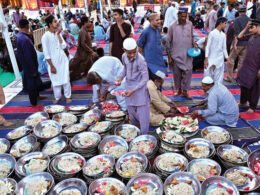Non-governmental organizations (NGOs) and relief organizations working in flood-affected areas should add sanitary pads to their ration bags, stressed Dr Nuzhat Faruqui, who has received Tamgha-e-Imtiaz for providing vital healthcare and relief services during natural disasters.
Faruqui is against the notion that women cannot take part in relief operations or rescue work. “I have done that,” she said, adding that the NGOs need to be cognizant of the fact that it is necessary to take female rescuers and volunteers to reach out to more and more women for help.
Citing national data, she said, 73,000 flood-hit women will give birth next month.
“This will be a huge challenge to provide a safe and secure birthplace to them,” she said. During 2010 floods, she along with her NGO ULPHAT Welfare Organization spent five months in temporary camps.
Faruqui was speaking to a webinar hosted by The Citizenry in collaboration with Times of Karachi titled, ‘Women’s Health in Flooded Areas: How better and sensitized decisions can be made to protect women?’ on Saturday. The Citizenry, a nonprofit organization, and Times of Karachi work on policy matters about citizens.
The Moderator of the webinar, journalist Hunain Ameen pointed out that 35 million people are directly affected by the floods and as per the latest estimates almost half of the country is underwater. He stressed the fact that half of the flood affectees population are women. Even in such a calamitous scenario, he said, mensuration and hygiene for women are considered taboo topics.
Faruqui explained how her NGO with Pakistan Navy was in a rescue operation during recent floods and found a woman in labour and they had no option but to have her through delivery. She pointed out how menstruation is a grave issue even during pregnancy and in normal checklists of relief works there is no mention of sanitary pads.
Journalist Sidra Dar, who has extensively covered Sindh’s flood-hit areas, said that the needs of both genders in flood-hit areas are poles apart. She was responding to Ameen’s question regarding how rescue and relief works are generally carried out by men only and how they impact women.
Men mostly demand shelter, food and water, whereas, women are in search of toilets. The women of the flood-hit areas she visited, do not eat or drink because of the fear of nature’s call. “We have a culture of parda throughout the country,” she said. If a woman from such a background is sitting at the corner of a street with other men, where will they go if nature calls?
She shared how just before sunset, in flood-hit areas or at makeshift tents, women carry their children or form a group of their gender and find a convenient place to defecate or urinate. “Imagine they will have to wait an entire day for this,” she said, adding that there are many pregnant women who are flood victims and during pregnancy, the urge to urinate is much more.
Sharing experiences of her conversations with the flood affectees Dar said, how one of the flood-hit mothers shared how her daughters were going through periods and she was tearing apart their spared clothes for that. The woman was brought to a government school, where at least 200 men were also living, and the building has only two washrooms. “Being a mother her concern was different. Food was the least of her priorities,” she said.
Dr Faruqui agreed and added that if flood-hit women don’t drink water and don’t use hygienic products during periods, the chances of Urinary Tract Infections (UTIs) would increase manifolds among them.
Dar said if a female reporter, doctors and journalists can go to such areas then female volunteers should also go, “as they (female affectees) are more comfortable talking with female volunteers.”
University of Punjab student, Bushra Mahnoor along with Bahauddin Zakariya University’s student Anum Khalid are running a campaign Mahwari Justice to ensure menstrual hygiene for the flood victims.
Speaking at the webinar, Mahnoor said that UTIs are very common among women. In 2010 floods, she recalled, how a huge percentage of female flood affectees were infected with UTIs, so much so that beds ran short in hospitals. Thinking of this, they decided to work on sanitary relief and decided to launch ‘Mahwaari justice’
They received negative feedback from everywhere and no relief organization supported them. “We were asked if we are sending pads to women, will we send shaving creams to men as well,” she said, adding that today they have reached out to 12,000 female flood affectees through a long journey since July.
When they reached out to the corporate sector for help, she said, no company donated more than 200 pads to them. Few of the companies were greedy and were not even ready to supply pads at cheaper rates.
Mahnoor shared she found out that four women of one family in flood-hit areas of Balochistan were using one piece of cloth for their periods. “The girl called me and said if we tear apart our dupatta (scarf), how we will cover ourselves,” she said.
Speaking on the allegations raised at them that how would flood-affected women learn to use pads, she responded, that women are adaptable and they can learn to use pads. Narrating her own story, Mahnoor shared how she comes from a middle-class Attock family and she and her five sisters could not afford sanitary pads and had to use clothes and experienced fungal infections and UTIs.
Dr Nuzhat Faruqui said that other means could be used if pads are not available – provided they are hygienic. The exposure duration of pads or clothes matters also. If it is changed in two to three hours or washed properly, she said, it would be considered okay.
At relief camps, she said, they can teach personal hygiene and women from rural areas are very quick learners “our women are very smart. When they use clothes or cotton, they can also use pads.” However, she said, they need to learn the disposal of pads.
Dar asked why men and women from urban areas are underestimating rural areas women. Why pads are considered luxury items? Speaking on the critics of menstrual pads, she said, even a tetra pack milk goes in ration bags and flood affectees have not consumed it ever. “Should we send a buffalo to their aid then?” she asked sarcastically.







